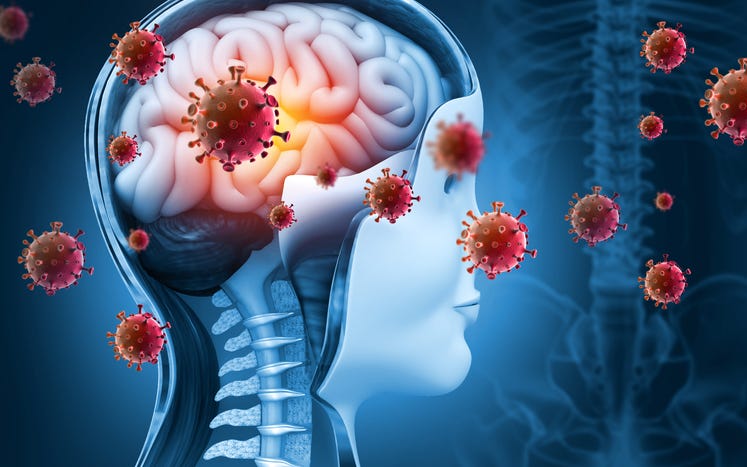
Researchers are offering a new explanation for why some patients experience long COVID -- the long-term symptoms like brain fog, fatigue and memory loss that continue months or even years following a COVID-19 infection.
According to a new study, published in the journal Cell, components of the SARS-CoV-2 virus can linger in the gut, which can reduce serotonin.
The reduction of serotonin can lead to persistent inflammation, memory loss and other neurological problems and symptoms.
According to the CDC, nearly one in five American adults who had COVID-19 experience symptoms of long COVID. Most patients complain of brain fog, the inability to focus on tasks, memory problems, general fatigue, and headaches. The mechanisms that cause long COVID have not been studied in depth, and treatments that are widely effective in reducing these long-term symptoms have not yet been developed.
These new findings may lead to new post-COVID treatments, like medications to boost serotonin.
"Many aspects of the basic biology underlying long COVID have remained unclear. As a result, we are lacking effective tools for the diagnosis and treatment of the disease," Maayan Levy, the study's senior author, said in a statement. "Our findings may not only help to untangle some of the mechanisms that contribute to long COVID, but also provide us with biomarkers that can help clinicians diagnose patients and objectively measure their response to individual treatments."
For the study, researchers evaluated the effects of long COVID in blood and stool samples from various clinical studies and in small animal models. The team found that some patients with long COVID had traces of the virus in their stool samples even months after infection.
The remaining virus triggers the immune system to release proteins that fight the virus, called interferons, according to the study. These interferons cause inflammation that reduces the absorption of the amino acid tryptophan in the gastrointestinal (GI) tract.
Tryptophan is a building block for several neurotransmitters, including serotonin, which is primarily produced in the GI tract and carries messages between nerve cells in the brain and throughout the body. It plays a key role in major functions such as regulating memory, sleep, digestion and wound healing. Serotonin is also an important regulator of the vagus nerve, a system of neurons that mediate the communication between the body and the brain.
The researchers found that when tryptophan absorption is reduced by persistent viral inflammation, serotonin is depleted, leading to disrupted vagus nerve signaling, which in turn can cause several of the symptoms associated with long COVID, such as memory loss.
The authors went one step further to identify if replenishing tryptophan or serotonin could treat long COVID symptoms. They found that serotonin levels could be restored, and memory impairment reversed, in small animal models through treatment with serotonin precursors or selective serotonin reuptake inhibitors -- though they add that more research is needed to measure a response to treatment.
"Clinicians treating patients with long COVID have been relying on personal reports from those patients to determine if their symptoms are improving," said Sara Cherry, co-senior author. "Now, our research shows that there are biomarkers we may be able to use to match patients to treatments or clinical trials that address the specific causes of their long COVID symptoms, and more effectively assess their progress."
